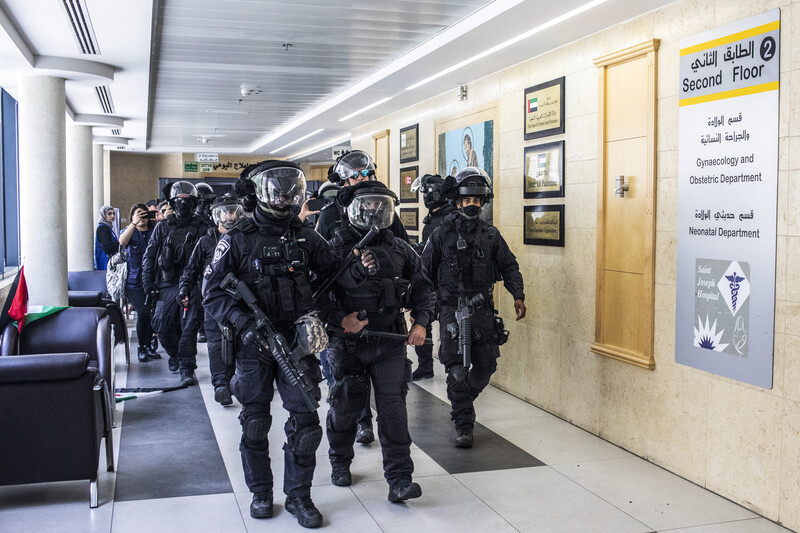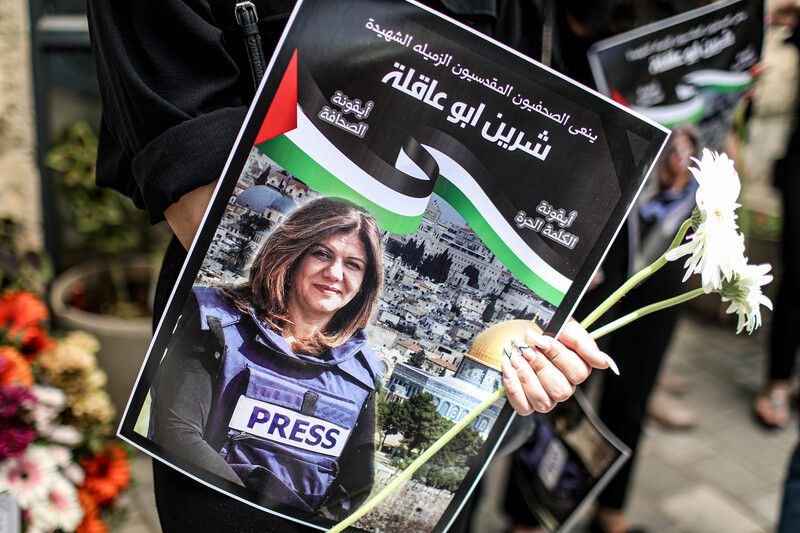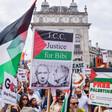Rights and Accountability 14 May 2022

Israeli police walk through the St. Louis French Hospital in Jerusalem where Shireen Abu Akleh’s body was being kept ahead of her funeral on 13 May.
DPAIsraeli spin doctors were surely working overtime this week.
First there was the campaign launched immediately after the killing of Al Jazeera journalist Shireen Abu Akleh in Jenin refugee camp on Wednesday.
Normally a boilerplate statement about stone-throwing, Molotov cocktails, or rioters is enough for Israel to justify the killing of an unarmed Palestinian.
But given Abu Akleh’s high profile – she was perhaps one of the most well-known working female journalists up until her death – Israel has been put under unusual international pressure.
The explaining began with Israeli officials, including prime minister Naftali Bennett, pointing blame at Palestinians for the iconic reporter’s killing while she was wearing a helmet and a bulletproof vest marked “press.”A video published by Israel suggesting she was killed by a bullet fired by resistance fighters was quickly debunked by the Israeli human rights group B’Tselem.
A field investigation by that group found that it would have been physically impossible for any bullet fired by the fighters in the video distributed by Israel to have hit Abu Akleh.
When that didn’t stick, and the condemnations continued to mount, the Israeli talking point turned to focusing on the Palestinian Authority’s entirely reasonable refusal to hand over the bullet recovered from Abu Akleh’s head for ballistic testing.Never mind that Israel has refused to cooperate with multiple United Nations commissions of inquiry, continues to deny entry to UN human rights investigators and human rights experts, and deported the director of Human Rights Watch’s Jerusalem office.
Or that it recently imposed “terror” group designations against Palestinian human rights groups – on the basis of secret (nonexistent) evidence – that monitor and document its human rights violations and are seeking accountability at the International Criminal Court.
Even Palestinian Authority leader Mahmoud Abbas’ fiercest critics would have a hard time arguing with his rejection of a joint investigation with Israel “because they committed the crime and because we don’t trust them.”
Perhaps it is the Palestinian Authority and other bodies that should be demanding Israel to release the GPS locations of all of its soldiers present in Jenin refugee camp the morning that Abu Akleh was killed. And while the Biden administration in Washington said it was satisfied with the Israeli military investigating itself for the killing of Abu Akleh – who was a US citizen – Israel’s “diaspora” minister said that “with all due respect … let’s say that Israel’s credibility is not very high in such cases.”The minister was putting it generously. Human rights groups – Palestinian, Israeli and international alike – have long dismissed Israel’s self-investigations as a whitewash mechanism that serves to shore up Israeli impunity.
An editorial published by Haaretz, Israel’s leading daily newspaper, stated that any investigation “must be completely detached from the combat forces, given the questions surrounding their conduct in Jenin and the possibility that they shot Abu Akleh.”Haaretz stated that the Israeli military’s special task force established to examine Abu Akleh’s killing would be led by Meni Liberty, head of a commando brigade “to which the Duvdevan elite counterterrorism unit, whose soldiers may have been responsible for the fatal shooting, is subordinate.”
As Friday wore on, Israeli media, fed information by Israeli military officials, reported that the possibility that a soldier killed Abu Akleh was edging ever nearer to certainty.
The Israeli military issued a statement clarifying that upon a preliminary investigation, it had determined that there were two scenarios that would explain Abu Akleh’s killing.
In the first scenario, Abu Akleh died as a result of armed Palestinians firing indiscriminately towards Israeli military vehicles.
However, witnesses and survivors of the burst of fire that killed Abu Akleh and wounded a second journalist have said from the beginning that there was no Palestinian resistance activity at the time and that the press crew came under Israeli attack.
A journalist with Al Jazeera’s investigative unit pointed out that the targeting of a young Palestinian wearing a white T-shirt and jeans – clearly not a uniformed Israeli soldier – while he was attempting to come to Abu Akleh’s aid gives further doubt to the Palestinian resistance fire scenario. “The theory it was a [Palestinian] gunman who mistakenly shot Shireen, then lay in wait to fire one bullet at a man in a white shirt after aiming at him for five to six seconds just doesn’t make sense to me,” Yarno Ritzen tweeted.“That one shot, to me, shows training, it shows trigger discipline, it shows deliberation,” Ritzen said.
“If you look at other [Israeli military] operational videos, there is always strict trigger discipline, always firing one or two well-placed shots,” Ritzen added.
The second scenario identified by the military is that a soldier using a gun with a telescopic sight aimed at a “terrorist” from the back of an army jeep but mistakenly hit Abu Akleh instead.
The highly specific nature of the second scenario suggests that Israel knows full well that one of its soldiers killed Abu Akleh in this manner.
It appears that the new hasbara talking point is to try to portray Abu Akleh’s death as a technical or operational error rather than a willful killing and premeditated murder – as is the conclusion of a preliminary field investigation by Al-Haq, a Palestinian human rights group.
The International Federation of Journalists concluded much the same and submitted a complaint to the International Criminal Court over the “deliberate systematic targeting of a journalist” by Israeli snipers.
Almost exactly a month before Abu Akleh’s death, a Palestinian child in Jenin refugee camp was killed in the same manner as described in the Israeli military’s second scenario.
Muhammad Qassim, 16, was shot dead by an Israeli soldier who aimed a gun from the back of an Israeli military vehicle – begging the question of whether the child was killed by the same soldier or unit or under the same commander responsible for Abu Akleh’s killing.
On the same day that Qassim was killed, lawyer Muhammad Assaf was shot in the heart in front of his young nephews by a soldier who fired out of the back of an army jeep.
All this is to say that if dozens of journalists killed by Israel over the past two decades isn’t enough to establish a pattern of behavior, there’s recent precedent for the Israeli military’s second scenario.
Attack on funeral
Meanwhile, Israeli police found themselves having to justify shocking footage of officers striking at pallbearers carrying Abu Akleh’s casket in the sanctuary of Jerusalem’s St. Louis French Hospital – an institution under French custodianship.
At first, the police claimed rock-throwing and published a video showing one person throwing what appears to be a water bottle. That video was later demonstrated to have been doctored: It is certainly not the first time that Israel has doctored footage of one of its attacks in an attempt to retroactively justify the unjustifiable.Then the Israeli police tweeted that plans for Abu Akleh’s funeral procession “were coordinated in advance by the Israel Police together with the Abu Akleh family.”
By “coordinated” the Israeli police mean that they summoned the slain journalist’s family and imposed conditions on her funeral procession, as was reported by Al Jazeera:
The Palestinian Center for Human Rights stated that Israel attempted to limit the number of people who participated in Abu Akleh’s funeral and stipulated that “her coffin was to be transported in a private vehicle under the condition that no Palestinian flags be raised nor mention of any national chants.”
An Israeli police officer removes a Palestinian flag during a gathering for Shireen Abu Akleh outside an East Jerusalem church on 12 May.
ActiveStillsThe Palestinian Center for Human Rights said that Israel had established dozens of police checkpoints around the area of Jerusalem’s Old City where the funeral was to take place.
Protesters gathered outside the St. Louis French Hospital carrying flags and posters of Abu Akleh.
“Scores [of] heavily armed Israeli police, along with a skunk truck, mounted police on horseback and Israeli Intelligence officers surrounded the entire hospital and prevented the gathered civilians, journalists and patients from entering it,” according to the Palestinian rights group.
“Israeli police also assaulted civilians and journalists at the hospital’s main gate.”
At that point the infamous assault on the pallbearers carrying Abu Akleh took place.
After Abu Akleh’s casket was put in the private vehicle, Israeli police stopped it and “removed Palestinian flags and shattered the vehicle windows.”
Upon arrival of Abu Akleh’s casket to the Roman Catholic Church in the Old City, Israeli police “began to attack civilians to disperse them, confiscate Palestinian flags, tear up pictures of Abu Akleh and signs protesting her killing.”
As the funeral procession proceeded to Abu Akleh’s place of burial, Israeli police harassed mourners and arrested more than a dozen Palestinians, according to PCHR.
Israel’s version of events is that “300 rioters” arrived to the hospital and prevented Abu Akleh’s family “from loading the coffin onto the hearse to travel to the cemetery – as had been planned and coordinated with the family in advance.”To add insult to literal injury, the police are spinning their actions as protecting the wishes of the Abu Akleh family by stating that “Israel Police instructed that the coffin be returned to the hearse, as did the EU ambassador and Abu Akleh’s own family, but the mob refused.”
And so police had to “disperse the mob and prevent them from taking the coffin,” according to Israel’s dubious narrative.

A protester holds flowers and a poster of Al Jazeera reporter Shireen Abu Akleh during a protest outside the St. Louis French Hospital in Jerusalem on 13 May.
DPAOn Saturday, in an attempt to take off the international pressure following the shocking funeral attack, Israel’s chief of police announced that he had ordered an investigation into police conduct.
Judging from past Israeli police internal investigations, that probe is all but certain to be at worst a cover-up or at best a joke.Abu Akleh’s brother roundly contradicted the Israeli police narrative in an interview with BBC News on Friday.
Anton Abu Akleh said that as soon as mourners began walking out of the hospital where his sister’s funeral procession began, “we were bombarded with several Israeli police and just for nothing, we were just leaving the hospital towards the church.”“We were shocked to see them just starting [to beat] people, throwing sound grenades, tear gas, all this, we cannot explain it, this thing happened without any explanation.”
Israeli police had imposed themselves on mourners in the Abu Akleh family’s home the day of her killing, ordering the family to turn off music that was playing outside while the family were receiving condolence calls.
Her brother made clear to the BBC that Abu Akleh’s funeral wasn’t just for her family and close friends, but for the Palestinian people as a whole.The quest for truth and justice for her killing is just the same.






Comments
I think something very sinister and cynical is taking place here
Permalink Just a dude replied on
If I had to guess, there could be a "western" backed futile Palestinian neoliberal "state" in the making behind the scenes.
Israel could very well be aware of it and is making sure it'll be as futile and demoralised as possible while also grabbing as much as it possibly can in the meanwhile.
The PA is a purely shameless entity.
The status quo is probably about to change and this extremely bizarre behaviour makes sense only if you take into consideration that as a colonial project the zionist regime has to inflict as much damage as it possibly can on it's subjects before "withdrawing".
I mean otherwise you'll just allow the Palestinians to have a moment for themselves.